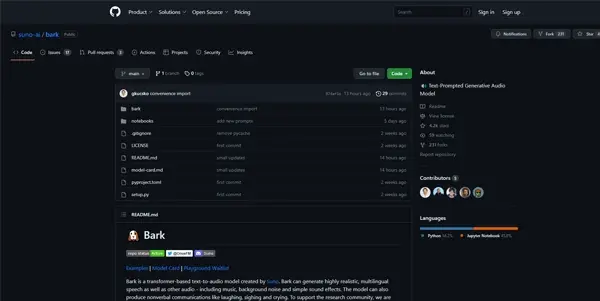Suno AI Bark

A free and open-source text-to-speech to easily generate realistic and natural voices
Suno AI Bark: A Free and Open-Source Text-to-Speech Solution
Suno AI Bark is a powerful and versatile text-to-speech (TTS) tool available as a free and open-source project on GitHub. It focuses on generating realistic and natural-sounding voices from text input, offering a compelling alternative to commercial TTS solutions. This article explores its capabilities, applications, and how it stacks up against competitors.
What Suno AI Bark Does
Suno AI Bark takes text as input and converts it into high-quality speech. Its core function is to bridge the gap between written and spoken word, offering a convenient and accessible method for generating audio from various textual sources. Unlike some TTS systems that produce robotic or unnatural-sounding output, Bark aims for a more human-like vocal delivery.
Main Features and Benefits
- Open-Source and Free: This is a key advantage. The source code is publicly available on GitHub, allowing users to inspect, modify, and contribute to its development. This fosters transparency and community engagement. Furthermore, the tool is entirely free to use.
- Realistic and Natural Voices: Bark prioritizes natural-sounding speech, striving to minimize the robotic quality often associated with TTS systems. This enhances user experience, making the generated audio more engaging and less jarring.
- Ease of Use: While the open-source nature requires some technical familiarity, the core functionality is designed to be relatively user-friendly. The project likely provides clear documentation and examples to aid users in implementation.
- Customizability (potential): Being open-source, users with the necessary skills can potentially customize the voices, accents, and other parameters to meet their specific needs. This allows for a higher degree of personalization compared to closed-source solutions.
Use Cases and Applications
The versatility of Suno AI Bark opens up numerous applications:
- Accessibility: Creating audio versions of text for visually impaired individuals.
- E-learning: Generating audio narration for educational materials, such as online courses and textbooks.
- Content Creation: Producing audio for podcasts, audiobooks, and other audio-based content.
- Prototyping and Development: Quickly generating speech for applications or prototypes that require voice interaction.
- Accessibility for Software: Integrating the TTS engine into software to provide voice feedback or narration.
- Game Development: Generating speech for non-playable characters (NPCs) or narration in video games.
Comparison to Similar Tools
Suno AI Bark differentiates itself from commercial TTS solutions like Amazon Polly, Google Cloud Text-to-Speech, and Microsoft Azure Text-to-Speech primarily through its open-source and free nature. Commercial tools often offer a wider range of voices and potentially more advanced features, but they usually come with associated costs. The trade-off lies in the flexibility and community support inherent in an open-source project versus the polished features and support of a commercial product. Direct comparison in terms of voice quality would require a thorough benchmark test.
Pricing Information
Suno AI Bark is completely free to use. There are no licensing fees or subscription costs associated with its usage. However, users should be aware of potential costs associated with running the software, such as cloud computing resources if deploying it in a cloud environment.
Conclusion
Suno AI Bark offers a compelling alternative for users seeking a free and open-source text-to-speech solution. Its focus on natural-sounding voices and its accessibility make it a valuable tool for a wide range of applications. While it may lack some of the advanced features of commercial offerings, its open-source nature and cost-effectiveness make it a strong contender, particularly for users who prioritize flexibility and community support.